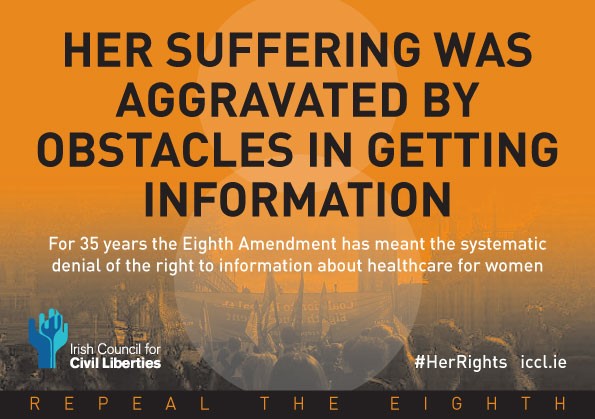The right to information in international law
Article 19 of the International Covenant on Civil and Political Rights asserts the right to freedom of expression and states “this right shall include freedom to seek, receive and impart information and ideas of all kinds”.
The UN Committee which monitors the implementation of this treaty, to which Ireland is a party, holds that this right includes the right to access information on healthcare, including abortion. This right is not absolute, but any interference with it must be justified on the following grounds:
(a) For respect of the rights or reputations of others;
(b) For the protection of national security or of public order, or of public health or morals.
The right to information in Irish law
In Ireland, the right to receive information about abortion services in other states is laid out in Article 40.3.3:
“This subsection shall not limit freedom to obtain or make available, in the State, subject to such conditions as may be laid down by law, information relating to services lawfully available in another state.”
However, the legislation providing for the right to information in Irish law – the Regulation of Information (Service outside the State for Termination of Pregnancy) Act 1995 – presents significant obstacles to women being able to access information about the necessary care, and presents ongoing and serious difficulties for doctors and counsellors in Ireland.
Under the Act, any information that is ‘likely to be required by a woman for the purposes of availing herself of services outside the State for the termination of pregnancies’ and ‘services or…persons who provide them’ is strictly controlled.
- Section 8 of the Act prohibits healthcare professionals from making an appointment or any other arrangement for or on behalf of a woman seeking to terminate her pregnancy outside the State.
- Section 13 of the Act declares that healthcare professionals are not required to provide information about abortion services abroad.
- Other provisions of the Act prohibit healthcare providers from providing information that could be seen to ‘advocate or promote’ abortion services.
Contravention of the Act is a criminal offence. The criminal prohibition applies in all circumstances, regardless of how complex a woman’s medical condition and care needs might be.
This means that when a pregnant person asks their doctor whether abortion would be in their best medical interest, the doctor cannot answer honestly in accordance with their clinical judgment.
If Article 40.3.3 of the Constitution is removed, the Oireachtas will be free to change this law so that women are provided with all of the information that they require to make private healthcare decisions.
There are numerous examples of cases where women have not been able to access information about their healthcare. The UN has found against the Irish state in some of these cases.
Amanda Mellet
In the case of Amanda Mellet, a woman who found herself carrying a foetus affected by a fatal foetal anomaly, the UN Human Rights Committee found that:
“The restriction on the author’s right to information did not comply with article 19 (3) of the Covenant. The State party has not justified the restrictions… There was no purpose other than to impair … enjoyment of her right to information related to abortion services abroad and [it] was disproportionate in light of the detrimental impact on her dignity and well-being.”
Siobhán Whelan
In the case of Siobhán Whelan, who received a diagnosis of fatal holoprosencephaly at Wexford General Hospital, and had to travel to Liverpool to receive the medical care she needed, the UN Committee found that:
“[her] suffering was further aggravated by the obstacles she faced in receiving information she needed about appropriate medical options from her known and trusted medical providers. The Committee notes that the Abortion Information Act legally restricts the circumstances in which any individual may provide information about lawfully available abortion services in Ireland or overseas, and criminalizes advocating or promoting the termination of pregnancy. The Committee further notes the author’s unrefuted statements that the health professionals in Ireland did not provide her with clear and detailed information on how to terminate her pregnancy in another jurisdiction or from which other health care providers she could obtain such information, thereby disrupting the provision of medical care and advice that she needed and exacerbating her distress.”
In this case, likely because of a fear of legal consequences, medical professionals did not provide Ms. Whelan with information she needed.
The chilling effect that the Eighth Amendment has on providing healthcare information means that a woman’s right to information about healthcare options is systematically and routinely violated when she becomes pregnant in Ireland.


